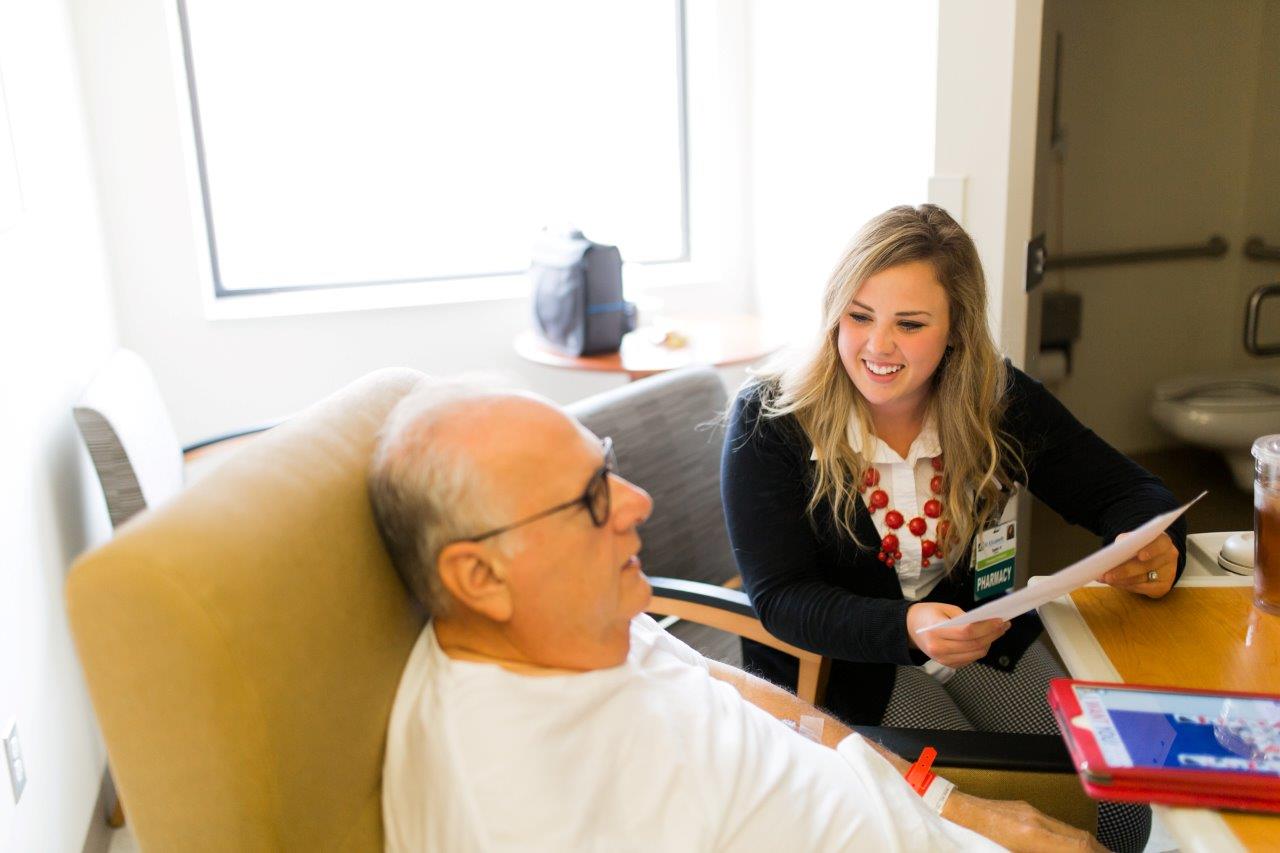PGY1 Pharmacy Residency
The PGY1 Pharmacy Residency at St. Elizabeth Healthcare is an ASHP-accredited 12-month structured training program designed to develop skills and competence in providing pharmaceutical care. The PGY1 residency is composed of four major elements:
Site Structure & Weekend Customization
St. Elizabeth Healthcare is uniquely able to offer pharmacy residents the opportunity to train in both academic and community hospitals within our health system. The site structure of our residency program ensures residents will become well-rounded practitioners through individualized training and attention and an educational environment with a variety of patient demographics and disease states.

Residency Program Leadership
PGY1 Pharmacy
Residency Program Director
Deanna Fliehman, Pharm.D., BCPS
[email protected]
The primary practice site for the residency program is St. Elizabeth Healthcare Edgewood in Kentucky, but residents can participate in patient care at the Dearborn, Florence, and Ft. Thomas facilities as well. All facilities are located within 15-35 minutes of each other. Each of these St. Elizabeth Healthcare Inpatient Pharmacies follow the same organizational policies and procedures. While most PGY1 Residents spend ~75% of their time at our Edgewood campus (primary practice site), our residents can customize their residency year through the selection of their “staffing home-base site”. The staffing home-base site is where residents complete their Longitudinal Pharmacy Staffing. Hypothetically, on the weekdays residents will spend time in a 500-bed hospital and on the weekend, they could staff in a smaller community hospital ranging from 60-150 beds. Each resident provides preference to the Residency Program Director on their “staffing home-base site”. Options include Dearborn (DBN), Edgewood (EDG), Florence (FLO), or Fort Thomas (FTT). Dearborn supports one resident, Edgewood supports four residents, Fort Thomas supports one resident, and Florence supports one resident during the residency year. The remainder of the residency year is spent rotating through the various sites dependent upon on the rotation being completed.
Since St. Elizabeth Healthcare’s hospitals operate in two states, our program offers two unique match numbers. The first match number is assigned to the six Kentucky-based (EDG, FLO, FTT) residency positions; the second match number is assigned to the single Indiana-based (DBN) position. Kentucky-based residents must be licensed pharmacists in the State of Kentucky. The Indiana-based resident must be licensed pharmacists in the State of Indiana and Kentucky. Interested candidates should apply to only the Kentucky Match Number (to avoid extra fees). Only one interview will be conducted for the entire program. Candidates can then rank (or not rank) both the Kentucky and Indiana match numbers according to their own personal preference of St. Elizabeth Healthcare staffing home-base site.
Precepting Philosophy
Team-based precepting is an innovative learning model based on the premise of collaborative mentoring. In this model, a primary preceptor works together with several other qualified pharmacists to provide quality rotation experiences for PGY1 residents. These interactions provide opportunities for coaching and facilitating personal and professional growth for residents.
Program Structure
The structure of the residency program at St. Elizabeth is based around monthly learning experiences (rotations). Staffing experiences will occur on the weekends and one evening shift every other week. Residency specific activities occur Monday through Friday. The typical resident schedule is Monday through Friday and every other weekend.
Rotations
St. Elizabeth’s PGY1 program offers a selection of diverse patient care rotations, allowing for the flexibility to pursue individual goals. During each rotation, the resident is expected to perform independently and demonstrate an increasing proficiency in pharmacy practice. The resident will develop critical thinking skills, while monitoring patient progress and medication therapy.
Required Rotations
- Orientation
- Ambulatory Care Choice
- Medication Management Clinic
- Anticoagulation Clinic
- Internal Medicine
- Pharmacy Administration & Drug Policy Development
- Medical Critical Care
- Cardiology
- Research & Practice Advancement
- Antimicrobial Stewardship
Required Longitudinal Rotations
- Pharmacy Staffing
- Grand Rounds
- Research and Practice Advancement
Elective Rotations
- Oncology
- Advanced Oncology
- Emergency Medicine
- Advanced Emergency Medicine
- Family Medicine (Ambulatory Care)
- Cardiovascular Critical Care
- Surgical Critical Care
- Advanced Heart Failure
- Surgery
- Academia
- Neonatal Intensive Care/Labor & Delivery
- Advanced Neonatal Intensive Care
- Anticoagulation Clinic
- Advanced Drug Policy Development
- Psychiatry
- Pharmacogenomics
- Medication Management Clinic
Elective Longitudinal Rotations
- Pharmacy Leadership
Research Project
Completion of a research project is a required component of the residency programs. The purpose of this requirement is to introduce the resident to the principles of scientific method including the design, preparation, performance and interpretation of a medical project. The resident also gains experience in the preparation of a manuscript for publication and improves his/her public speaking skills through formal presentation.
Hospital Committee Assignments
The PGY1 Pharmacy Resident is required to serve on a hospital multidisciplinary committee as a non-voting member. The purpose of this activity is to provide the resident with the opportunity to gain experience in the decision-making process encountered with committee work as well as multi-disciplinary interactions in a setting outside of clinical practice. Residents are also required to attend at least one Pharmacy & Therapeutics / Infection Control Committee Meeting (PTIC), one Medication Management Committee meeting, and one Pharmacy Clinical Practice Council Meeting.
Teaching Certificate Program
Though not a program requirement, residents have the opportunity to participate in the Teaching Certificate Program (TCP) affiliated with the James L. Winkle College of Pharmacy (University of Cincinnati). Residents participate in formal seminars on precepting philosophy and technique, teaching experiences at the college of pharmacy and the development of a teaching portfolio program. This program will allow the resident to gain a broad understanding of issues in pharmacy education and opportunities to practice their teaching skills.

